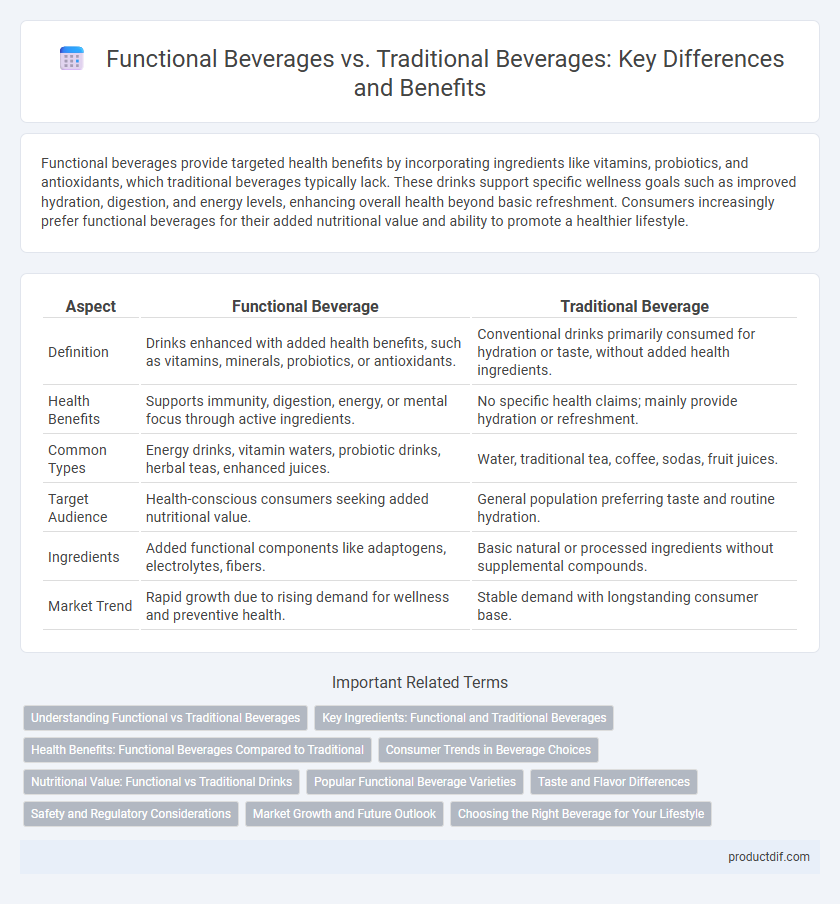Functional beverages provide targeted health benefits by incorporating ingredients like vitamins, probiotics, and antioxidants, which traditional beverages typically lack. These drinks support specific wellness goals such as improved hydration, digestion, and energy levels, enhancing overall health beyond basic refreshment. Consumers increasingly prefer functional beverages for their added nutritional value and ability to promote a healthier lifestyle.
Table of Comparison
| Aspect | Functional Beverage | Traditional Beverage |
|---|---|---|
| Definition | Drinks enhanced with added health benefits, such as vitamins, minerals, probiotics, or antioxidants. | Conventional drinks primarily consumed for hydration or taste, without added health ingredients. |
| Health Benefits | Supports immunity, digestion, energy, or mental focus through active ingredients. | No specific health claims; mainly provide hydration or refreshment. |
| Common Types | Energy drinks, vitamin waters, probiotic drinks, herbal teas, enhanced juices. | Water, traditional tea, coffee, sodas, fruit juices. |
| Target Audience | Health-conscious consumers seeking added nutritional value. | General population preferring taste and routine hydration. |
| Ingredients | Added functional components like adaptogens, electrolytes, fibers. | Basic natural or processed ingredients without supplemental compounds. |
| Market Trend | Rapid growth due to rising demand for wellness and preventive health. | Stable demand with longstanding consumer base. |
Understanding Functional vs Traditional Beverages
Functional beverages contain added ingredients like vitamins, minerals, probiotics, or antioxidants designed to provide specific health benefits beyond basic hydration, unlike traditional beverages which primarily focus on taste and refreshment. Examples of functional beverages include fortified waters, energy drinks, and herbal teas, whereas traditional beverages encompass plain water, coffee, and soda. The growing consumer demand for health-conscious options drives innovation in the functional beverage market, differentiating it from the conventional beverage industry.
Key Ingredients: Functional and Traditional Beverages
Functional beverages typically contain bioactive ingredients such as probiotics, vitamins, minerals, antioxidants, and herbal extracts, designed to promote health benefits like improved digestion, enhanced immunity, and increased energy. In contrast, traditional beverages primarily rely on basic ingredients like water, sugar, natural flavors, and caffeine, focusing on refreshment and taste rather than health enhancement. The rising demand for functional beverages reflects consumer interest in added nutritional value and wellness support beyond conventional hydration.
Health Benefits: Functional Beverages Compared to Traditional
Functional beverages enhance health by containing added vitamins, minerals, probiotics, and antioxidants that support immunity, digestion, and energy levels, unlike traditional beverages which primarily provide hydration or taste. Ingredients such as electrolytes and herbal extracts in functional beverages contribute to improved metabolic functions and reduced inflammation. Consumers seeking targeted health benefits often prefer functional beverages for their scientifically-backed formulations.
Consumer Trends in Beverage Choices
Consumers increasingly prefer functional beverages over traditional beverages due to rising health and wellness awareness, seeking products with added benefits like probiotics, vitamins, and antioxidants. Market data shows a significant growth in functional beverage segments such as enhanced water, energy drinks, and fortified teas, driven by demands for improved hydration, energy, and immune support. Traditional beverages face declining consumption patterns as younger demographics prioritize nutritional value, natural ingredients, and sustainability in their beverage choices.
Nutritional Value: Functional vs Traditional Drinks
Functional beverages offer enhanced nutritional value by incorporating bioactive compounds such as vitamins, minerals, probiotics, and antioxidants that support health and wellness. Traditional beverages typically provide basic hydration with limited nutritional benefits and lack targeted health-promoting ingredients. The inclusion of functional ingredients in modern drinks addresses specific dietary needs, promoting improved digestion, immune function, and energy levels compared to conventional options.
Popular Functional Beverage Varieties
Popular functional beverages include energy drinks, fortified waters, and probiotic drinks, each designed to deliver specific health benefits such as improved hydration, enhanced mental alertness, or digestive support. Traditional beverages, like sodas and juices, mainly focus on taste and refreshment without added health-enhancing ingredients. The rising consumer demand for wellness has fueled rapid innovation in the functional beverage market, with products incorporating vitamins, minerals, adaptogens, and electrolytes gaining prominence.
Taste and Flavor Differences
Functional beverages often feature intensified flavor profiles designed to mask or complement added vitamins, minerals, and botanical extracts, creating a more complex taste compared to traditional beverages. Traditional beverages typically emphasize classic, familiar taste profiles with natural sweetness and simplicity, appealing to consumers seeking straightforward refreshment. The inclusion of functional ingredients can sometimes introduce bitterness or herbal notes, making flavor balancing crucial for consumer acceptance.
Safety and Regulatory Considerations
Functional beverages often undergo rigorous safety evaluations and comply with stringent regulatory frameworks due to their bioactive ingredients and health claims, which are monitored by entities such as the FDA and EFSA. Traditional beverages, typically derived from conventional ingredients without added health functionalities, are subject to standard food safety regulations but face fewer scrutiny regarding health claims. Ensuring accurate labeling, ingredient transparency, and adherence to permissible health claims is critical in maintaining consumer trust and regulatory compliance for functional beverages.
Market Growth and Future Outlook
The functional beverage market is experiencing rapid growth, driven by increasing consumer demand for health-enhancing ingredients such as vitamins, probiotics, and adaptogens, outperforming the traditional beverage sector in innovation and revenue expansion. Market analysts project the global functional beverage market to reach a valuation of over $275 billion by 2030, fueled by trends in wellness and preventive healthcare. Future outlook indicates sustained growth supported by technological advancements, personalized nutrition, and rising awareness of functional benefits compared to the stagnant growth of traditional beverages.
Choosing the Right Beverage for Your Lifestyle
Functional beverages offer targeted health benefits through added vitamins, minerals, and probiotics, making them ideal for active lifestyles focused on wellness. Traditional beverages, such as tea, coffee, and soda, provide familiar flavors without extra health enhancements, suitable for casual consumption and social settings. Selecting the right beverage depends on individual goals like hydration, energy, or nutrient supplementation, aligning with personal health priorities and daily routines.
Functional Beverage vs Traditional Beverage Infographic

 productdif.com
productdif.com